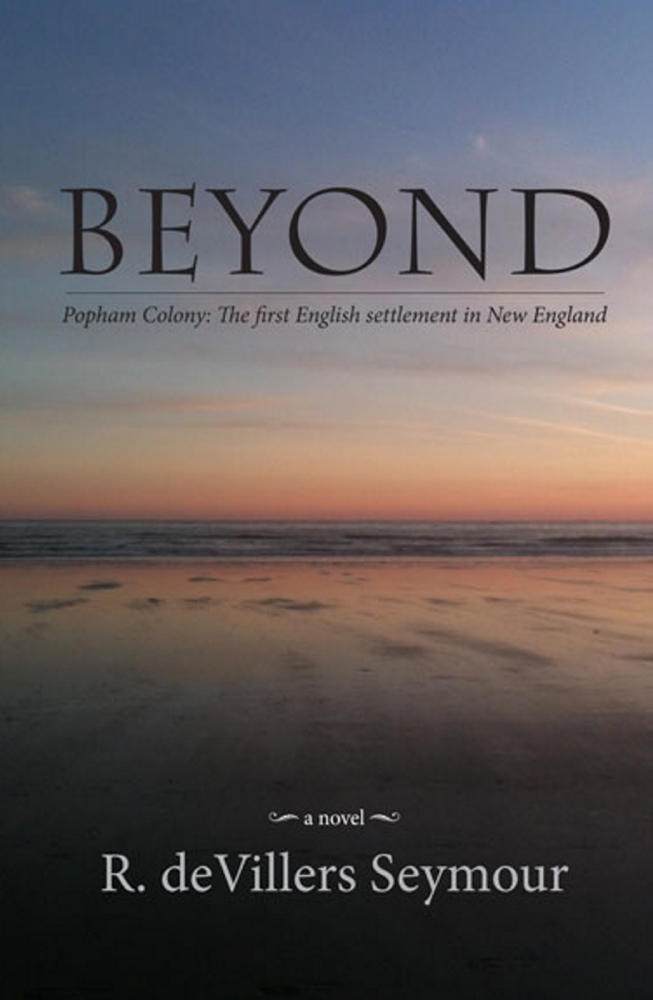Let me say that the novel “Beyond: Popham Colony: The First English Settlement in New England” is written with panache from start to finish, and is almost certain to engage all manner of readers. It is based on the best current research, including Douglas W. Rice’s “The Life and Achievement of Sir John Popham” and Jeffrey Brain’s “Fort St. George: Archaeological Investigation of the 1606-1608 Popham Colony”). The recent availability of well-documented, clearly written histories and biographies has prepared the way for a finer grade of fiction.
There can be little doubt that Brunswick’s R.de Villers Seymour has not only the perfect 17th-century name for authorship but, with a lifetime summering on MacMahan Island at the mouth of the Sheepscot and a quarter-century spent practicing clinical psychology, can summon up multifaceted characters. This is a volume to simply enjoy. It speaks of the early contact between Maine’s first people (with perhaps as many as 12,000 years of settlement in North America) and the johnny-come-lately English with their thirst for new lands to “improve” and expand upon.
Reader will have their favorite characters, and I must say that mine is Skidwarres, one of a group of Indians kidnapped and brought to England, (the list reads like an Elizabethan revenge tragedy and describes gentlemen, servants and sagamos, or commanders). Skidwarres, thought to be a gentleman, readily learns English and becomes a key interlocutor between his culture and the Europeans. Though marveled at as a “savage” by the court, it is he, not the “educated” English, who becomes proficient in language. What would become the Wabanaki language was like Irish, beneath the interest of Oxford dons, good only for commercial dealings.
In England the handsome, dark Skiddwarres became one of the popular young lads, boon companion of the lighthearted Richard Seymour (a young blood seeking his place among relations in English society). Richard is related to everyone, including the Gilberts. He has been assigned to make “Skid” his special project and no special problems arise. They foil highway men and romance hussies as well as noble ladies. Though the story may have been spiced up a bit, it works for this reader.
On occasion there are anachronisms that would probably only annoy a historian, not a general reader. These are few and include the multiple use of the word “sadism” in conversation between characters living in 1607-1608 ( the Marquis de Sade had yet to leave his dubious marks on civilization) as well as “Quixotic,” which would not have entered common English so soon. Also I do not believe that Admiral Gilbert would have been “too bubbly with Champagne for such seriousness” – while the area of Champaign indeed produced fine wines they were not sparkling or bubbly and would not be for some decades. While most readers might easily miss these little jolts, the next edition of “Beyond” should simply remove them.
The author clearly revels in the cultures on both shores of the Atlantic, and for most part reconstructs two worlds of plausibility. The English are always concerned with the future, the inhabitants of what became Maine with the past – family, spirits, etc. – and there is as much or more inhumanity practiced in the British Isles as in the forest of America. The “gentlemen” Richard Seymour and Skidwarres frequently debate the essays of Michel de Montaigne, but it is Seymour who fails to discern the differences between truth and falsehood, real and imagining. Ultimately it does not spoil the book, but I found myself hoping for Richard to be, if not stronger, then more capable of evolving.
“Beyond” takes us to a Popham that may well have existed, a fort and land peopled with Indian towns on the brink of tumultuous changes. It is beautifully handled.
William David Barry is a local historian who has authored/co-authored seven books, including “Maine: The Wilder Side of New England” and “Deering: A Social and Architectural History.” He lives in Portland.
Send questions/comments to the editors.



Success. Please wait for the page to reload. If the page does not reload within 5 seconds, please refresh the page.
Enter your email and password to access comments.
Hi, to comment on stories you must . This profile is in addition to your subscription and website login.
Already have a commenting profile? .
Invalid username/password.
Please check your email to confirm and complete your registration.
Only subscribers are eligible to post comments. Please subscribe or login first for digital access. Here’s why.
Use the form below to reset your password. When you've submitted your account email, we will send an email with a reset code.